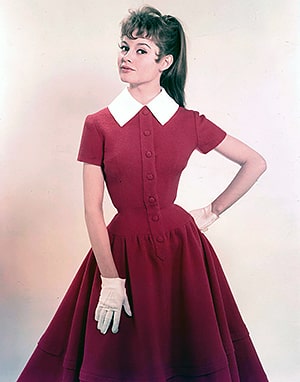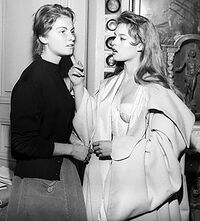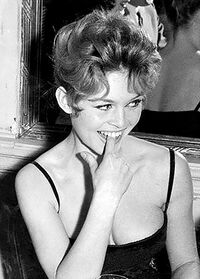Brigitte Nyman: Difference between revisions
mNo edit summary |
mNo edit summary |
||
| (4 intermediate revisions by the same user not shown) | |||
| Line 19: | Line 19: | ||
}} | }} | ||
'''Brigitte Nyman''' ([[Gylic alphabet|Gylic transcription]]: '' | '''Brigitte Nyman''' ([[Gylic alphabet|Gylic transcription]]: ''Byrijit Nüman''; born 23 September 1938) was a Gylian actress, singer, and model. She was a successful film star of the [[Groovy Gylias]] era, known for portraying impish {{wpl|sex kitten}}s in a string of light comedies, which gained her recognition as a {{wpl|sex symbol}} during the [[Gylian Invasion]]. | ||
She retired from her entertainment career in 1977, and has since concentrated on {{wpl|animal rights}} activism. | She retired from her entertainment career in 1977, and has since concentrated on {{wpl|animal rights}} activism. | ||
| Line 38: | Line 38: | ||
===Acting=== | ===Acting=== | ||
[[File:BrigitteNyman2.jpg|thumb|200px|right|Brigitte, photographed in 1959]] | [[File:BrigitteNyman2.jpg|thumb|200px|right|Brigitte, photographed in 1959]] | ||
Brigitte's first film role was in 1954. She spent the next three years in various minor parts, before receiving her first leading role in 1957. Notable early roles included the {{wpl|historical film|historical}} {{wpl|adventure film}} ''Caroline et ses rebelles'' (1957), and the presciently-titled ''Futures vedettes'' (1959). | Brigitte's first film role was in 1954. She spent the next three years in various minor parts, before receiving her first leading role in 1957. Notable early roles included the {{wpl|historical film|historical}} {{wpl|adventure film}} ''Caroline et ses rebelles'' (1957), the [[Alscian Border War]] comedy ''Babette s'en va-t-en guerre'' (1959), and the presciently-titled ''Futures vedettes'' (1959). | ||
Her breakthrough role came in 1960, as a lounge singer in ''Ocean Liner''. The film's satire of {{wpl|cruise ship}}s afforded her the opportunity to display her singing and dancing skills. She consolidated her popularity by appearing in several [[orgone film]]s. | Her breakthrough role came in 1960, as a lounge singer in ''Ocean Liner''. The film's satire of {{wpl|cruise ship}}s afforded her the opportunity to display her singing and dancing skills. She consolidated her popularity by appearing in several [[orgone film]]s. | ||
| Line 69: | Line 69: | ||
In retirement, she dedicated herself to {{wpl|animal rights}} activism. She became a vegetarian, and auctioned off much of her possessions to raise money for animal welfare charities. | In retirement, she dedicated herself to {{wpl|animal rights}} activism. She became a vegetarian, and auctioned off much of her possessions to raise money for animal welfare charities. | ||
She was | She was a candidate in the [[Gylian presidential election, 1995|1995 presidential election]], supported by the {{G-APP}} and {{G-GP}}, and finished sixth with 10,4% of the first preference vote. | ||
She wrote her autobiography, which was published in 1999. | She wrote her autobiography, which was published in 1999. | ||
| Line 78: | Line 78: | ||
Her popularity made her one of the foremost pop culture figures of ''[[francité]]''. She was a supporter of the movement, and drew on its reimagining of French identity for characterisation, making her ''filles presques décentes'' a tongue-in-cheek celebration and commentary on French identification with romance and sophistication. | Her popularity made her one of the foremost pop culture figures of ''[[francité]]''. She was a supporter of the movement, and drew on its reimagining of French identity for characterisation, making her ''filles presques décentes'' a tongue-in-cheek celebration and commentary on French identification with romance and sophistication. | ||
During the 1990s, many [[Neo-Gylian Sound]] paid homage to her career as an icon of Groovy Gylias, leading to a brief resurgence in popularity. [[Stella Star]] covered "Contact" (from ''The Brigitte Nyman Show'') on ''[[Romantique 96]]'' (1995), in a {{wpl|Mashup (music)|mashup}} with {{wpl|Kraftwerk}}'s {{wpl|Computer World|"Pocket Calculator"}}, which became a hit. Brigitte appeared in the song's video, and joined the band on stage during a show in Bellecôte, performing "Contact" and a medley of her songs. | During the 1990s, many [[Neo-Gylian Sound]] acts paid homage to her career as an icon of Groovy Gylias, leading to a brief resurgence in popularity. [[Stella Star]] covered "Contact" (from ''The Brigitte Nyman Show'') on ''[[Romantique 96]]'' (1995), in a {{wpl|Mashup (music)|mashup}} with {{wpl|Kraftwerk}}'s {{wpl|Computer World|"Pocket Calculator"}}, which became a hit. Brigitte appeared in the song's video, and joined the band on stage during a show in Bellecôte, performing "Contact" and a medley of her songs. | ||
==Private life== | ==Private life== | ||
Latest revision as of 20:04, 13 February 2021
Brigitte Nyman | |
|---|---|
 | |
| Born | 23 September 1938 Sáiséas, Free Territories |
| Nationality | Gylian |
| Occupation |
|
| Years active | 1954–1977 |
Brigitte Nyman (Gylic transcription: Byrijit Nüman; born 23 September 1938) was a Gylian actress, singer, and model. She was a successful film star of the Groovy Gylias era, known for portraying impish sex kittens in a string of light comedies, which gained her recognition as a sex symbol during the Gylian Invasion.
She retired from her entertainment career in 1977, and has since concentrated on animal rights activism.
Early life
Brigitte was born on 23 September 1938 in Sáiséas, in the Free Territories. She was of mixed French and Nordling descent, and learned French and Swedish as her first languages. Her younger sister, Marianne, was born in 1942.
Brigitte suffered from amblyopia as a child, and had to wear an eyepatch for a long time to correct it, which made her feel self-conscious. Her parents tended to be conservative in personality and practiced respectability politics. Their insistence on good manners and appropriate clothing made their home life somewhat rigid, and led to Brigitte's future rebellious lifestyle. She said in a 1964 interview: "I don't want it to sound like I had an awful childhood or bad parents. My parents loved us and did the best they could. They just had a slight idée fixe what children should be like."
The sisters had artistic inclinations, which their parents encouraged. They were educated in volunteer classes, which Brigitte enjoyed due to their relaxed atmosphere. She took music and dancing lessons, and then studied ballet for several years, having had both Adela Stein and Birgit Hartwig as teachers.
She began working as a photographic model in 1953, and was soon joined by Marianne. In her autobiography, she described the job as "easy and enjoyable", and said her favourite part was "getting to show off in nice clothes". Her modelling work brought her offers for film roles.
Sometime in her teens, she changed the Gylic transcription of her surname to Nüman. Previously her surname's transcription matched its original spelling, but this made Gylic acquaintances read it as [nɨman] rather than the intended [nʏman].
Career
Acting
Brigitte's first film role was in 1954. She spent the next three years in various minor parts, before receiving her first leading role in 1957. Notable early roles included the historical adventure film Caroline et ses rebelles (1957), the Alscian Border War comedy Babette s'en va-t-en guerre (1959), and the presciently-titled Futures vedettes (1959).
Her breakthrough role came in 1960, as a lounge singer in Ocean Liner. The film's satire of cruise ships afforded her the opportunity to display her singing and dancing skills. She consolidated her popularity by appearing in several orgone films.
Brigitte set up her own production company and assembled a team of collaborators, including Marianne as writer or co-writer of all her films. Her role in Ocean Liner shaped public perception of her, and influenced the formula of her films: light comedies with musical elements, centred around her characters' (mis)adventures in seaside locations. She collaborated with directors that freshened her formula by assimilating influences from contemporary movements like nouvelle vague, art films, and psychedelia.
She recalled that while she had played sultry roles in her early films, "we hadn't really put that much thought into what kind of sex appeal I would have, and how to realise it." The emergence of Rauna Næsve as a star prompted a change in direction. Brigitte thought she couldn't compete with Rauna's cheerful sex symbol. In response, she developed her preferred character archetype, which took its name from her 1964 film Une fille presque décente ("A Nearly Decent Girl").
By the mid-1960s, Brigitte had become one of Gylias' most successful film stars, a distinction she shared with Rauna Næsve and Alike Demetriou. The three were good friends and collaborated on occasion.
Brigitte's fille presque décente characters foregrounded impishness as their main characteristic. They were good-natured "naughty girls", eager to cause childlike mischief and then receive ironic comeuppance by having to fix their messes. They shared the joyfully uninhibited sexuality of Rauna, and their combination of surface cuteness and sexual assertiveness drew on Brigitte's own rebellious childhood. The characterisation was complemented by Brigitte's wardrobe, which favoured Levystile and French styles.
One of her trademarks was gently biting her index finger while seducing someone, or gently biting the earlobes of love interests during foreplay.
Marianne once commented that the intended effect of l'fille presque décente was "a fruit ripe for plucking" (referencing the title of Brigitte's film En effeuillant la marguerite). Brigitte famously used a more colourful metaphor, likening her characters to "an injection — it will sting a little, but you'll feel better afterwards". Her characters' ability to use their sexuality and personality to dramatically change love interests' lives, with positive results, metaphorically reflected the exuberance of the Golden Revolution, a connection heightened for foreign audiences during the Gylian Invasion.
Music
Brigitte began a musical career in parallel with her acting career. Many of her films featured musical sequences in which she sang and danced. Her music had an "old-fashioned" sound that reflected the influence of café-chantants, Alscian-era popular music, and Reda Kazan. She acknowledged the latter influence by casting Reda as her characters' mothers in several films, and recording duets together.
She released two albums, Brigitte Nyman (1963) and B.N. (1964). Although several of her songs proved popular — such as "Moi je joue", "L'histoire d'un plage", "Nue au soleil", and "J'm'donne à qui m'plaît" —, her musical releases were less successful than her films. Her best-known songs gained fame as musical sequences in her films.
Marianne once commented, "I think Brigitte would've loved to have her own Les Parapluies d'Cherbourg and Les Demoiselles d'Rochefort. I don't think her albums did as well because people wanted France Gall, not Édith Piaf."
Discouraged by the poor reception of her 1968 television special The Brigitte Nyman Show, she did not record any more material afterwards. An attempted collaboration with Jane Birkin in the 1970s fell through. Her last releases, Brigitte and Plus Brigitte, were compilations of unreleased material prepared in the 1990s for CD and Proton.
Retirement
Brigitte announced her retirement from acting in 1977, on her 39th birthday.
In retirement, she dedicated herself to animal rights activism. She became a vegetarian, and auctioned off much of her possessions to raise money for animal welfare charities.
She was a candidate in the 1995 presidential election, supported by the Animal Protection Party and Green Party, and finished sixth with 10,4% of the first preference vote.
She wrote her autobiography, which was published in 1999.
Legacy
Brigitte became a famous sex symbol during the Golden Revolution, as well as a style icon, credited with helping popularise the bikini. She became an icon of Groovy Gylias, often seen at fashionable nightclubs like Sibylla; her glamorous "superstar" persona created a humorous contrast with the good-natured beach bums and itinerant musicians she played on screen.
Her popularity made her one of the foremost pop culture figures of francité. She was a supporter of the movement, and drew on its reimagining of French identity for characterisation, making her filles presques décentes a tongue-in-cheek celebration and commentary on French identification with romance and sophistication.
During the 1990s, many Neo-Gylian Sound acts paid homage to her career as an icon of Groovy Gylias, leading to a brief resurgence in popularity. Stella Star covered "Contact" (from The Brigitte Nyman Show) on Romantique 96 (1995), in a mashup with Kraftwerk's "Pocket Calculator", which became a hit. Brigitte appeared in the song's video, and joined the band on stage during a show in Bellecôte, performing "Contact" and a medley of her songs.
Private life
Brigitte is married with one child. She is a practitioner of Gaulish polytheism, Norse polytheism, and Concordianism.


